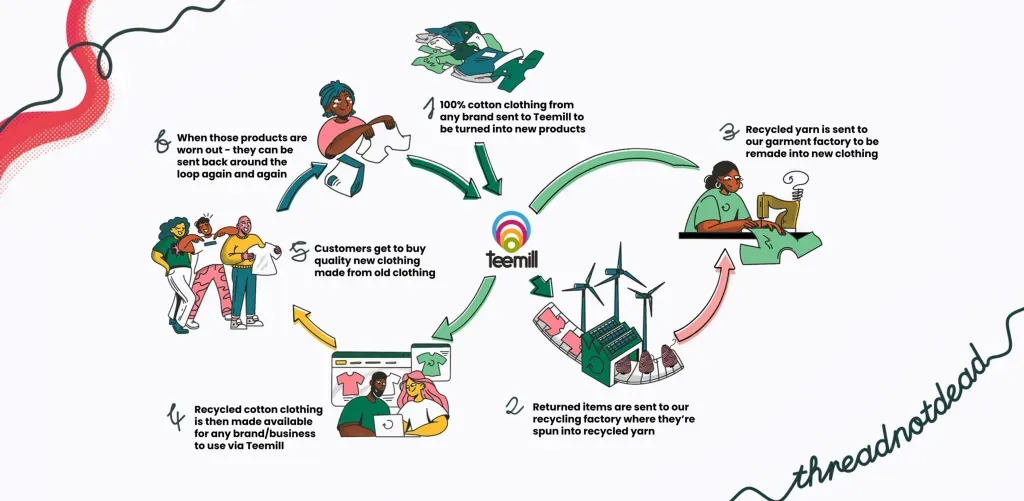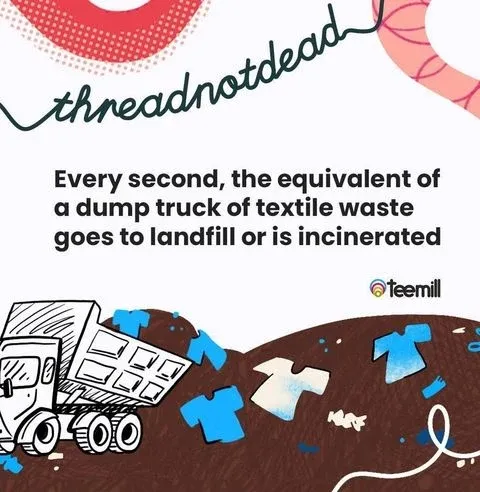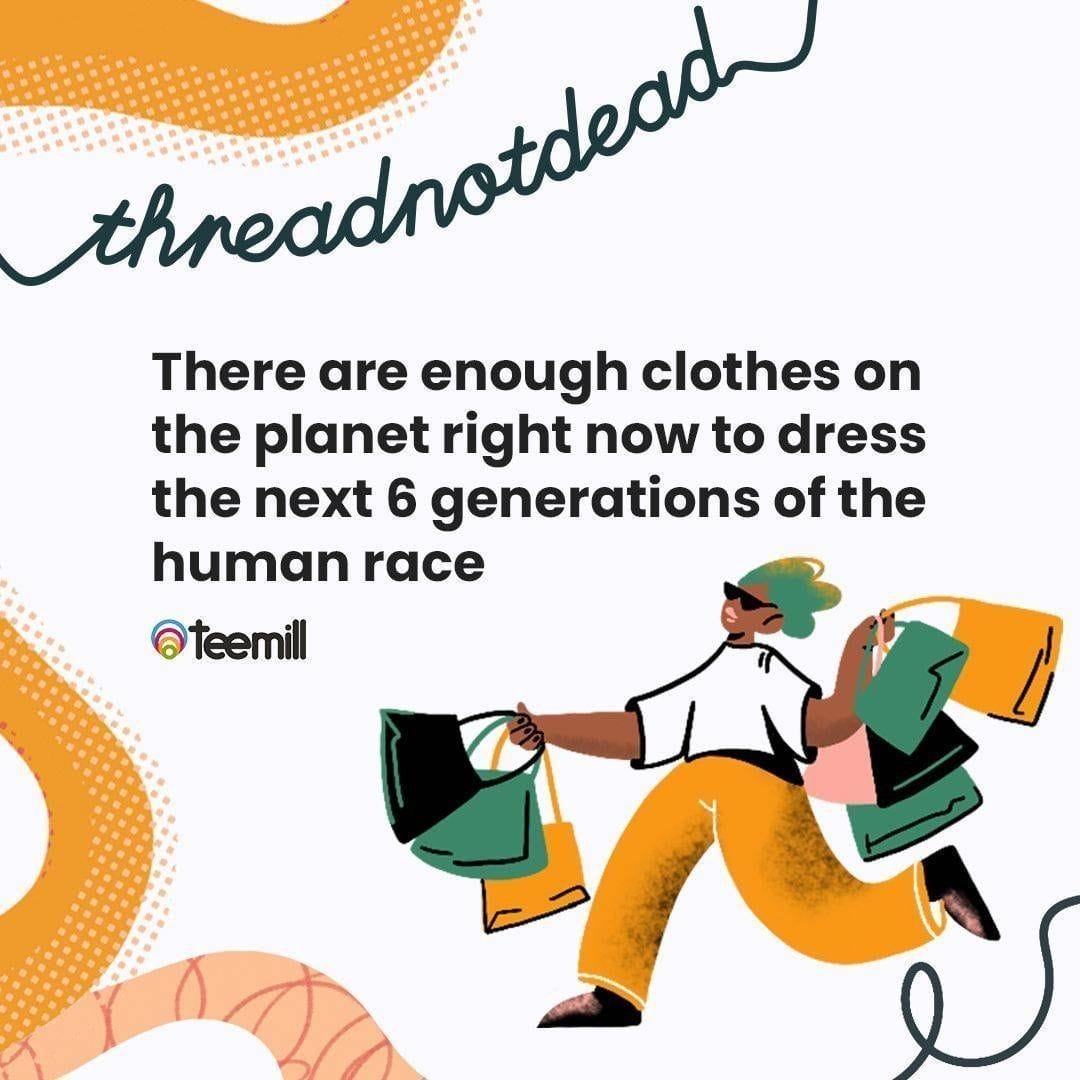Thread Not Dead - Teemill's Answer To Textile Waste?
With over 5.8 million tonnes of textile waste disposed of every year, could Teemill's Thread Not Dead be part of the solution?

WRAP (2012) estimated 1.14 million tonnes of clothes are supplied onto the UK market each year; with 430,000 tonnes of textiles incinerated or sent to landfills. An analysis by Labfresh on the 15 European nations that produce the largest amounts of textile waste each year ranked the United Kingdom fourth. The analysis found the United Kingdom produces 206.456 tonnes of textile waste in a year. This remains the case as Reuters (2023) reported that the UK generates enough waste textiles every year to fill Wembley Stadium 17 times over, creating an estimated 200,000 tonnes being sent to landfill or incineration. The Labfresh analysis says that each Briton produces 3.1 kg of textile waste; of which 2.5 kg is incinerated or enter landfills.
Similarly, a report written by Friends of the Earth Europe analysed European consumers textile waste and found 5.8 million tonnes are disposed of yearly. The same report found 4.3 million tonnes of textiles are sent to landfills or incinerated. Despite the abundance of clothes, less than 1% is turned from old textiles into new.
Could 'Thread Not Dead' reduce the United Kingdom's textile waste?
Why Is It Hard To Turn Old Textiles Into New?
BBC Future says that much of the problem comes down to what our clothes are made from. The fabrics we wear are complex combinations of fibres, fixtures, and accessories. They are made from problematic blends of natural yarns, man-made filaments, plastics, and metals. Some t-shirts might be made from 100% cotton, whereas others might use a 60% Cotton, 40% Polyester blend, for example. This means the top will be far harder to process, if possible.
BBC Future gives the following example “…a 100% cotton t-shirt contains many other components such as labels and sewing threads which are usually made from another material like polyester,” says Prajapati. “Similarly, a typical pair of jeans are made from cotton yarn which is generally blended with elastane, and other components such as zips and buttons and polyester sewing thread and dyed using a range of dyes.”

Who Are Teemill?
Teemill operates Rapanui, one of Ethical Consumer Best Buys, and their free e-commerce website allowing anyone to sell GOTS certified organic cotton clothing. Moreover, all deliveries are packaged without plastic and tops are printed seconds after they are ordered in factories powered by renewable energy.
Official Thread Not Dead Announcement
Posted on Rapanui the brand says that 'to end waste, we’ve always encouraged you to send back your worn out Rapanui products to be remade through our Remill process. We’re excited to announce we can now recover 100% cotton clothing from any brand, to be remade into new clothing. Together we can make Thread Not Dead.'
What is Thread Not Dead?
Teemill has launched Thread Not Dead, which builds on their take back system. Originally, any non intimate worn product (socks/underwear) could be returned and made in to new products. Their scheme has taken back over 38,000kgs of material, however, they have recently scaled up their take back to tackle the size of the problem as discussed in the following video.
How Does Thread Not Dead Work?
Teemill explains that their take back system works by accepting 100% cotton clothing (except denim and underwear) from any brand. Returned items are sent to their recycling factory where they're spun into recycled yarn. Teemill says that the recycled yarn is sent to their garment factory to be remade into new clothing; at that point, the recycled cotton clothing is then made available for any brand/business to use via Teemill. Finally, customers get to buy quality new clothing made from old clothing. Once those garments have worn out, Teemill says they can be sent back around the loop again and again.
To celebrate the launch of this new initiative, Teemill have made the following promotional video.
Why Is Thread Not Dead Important?
The fashion industry requires extensive resources to produce the garments we wear. The Intergovernmental Panel on Climate Change (IPCC) in 2020, calculated the fashion industry produces 10% of global carbon dioxide emissions every year, while it is estimated to use around 1.5 trillion litres of water annually. Therefore, it is important to keep garments out of landfills and away from incineration plants. Earth.org which cited Triplepundit says keeping cotton out of landfills is essential. Triplepundit says that 2,700 litres of water needed to make just one t-shirt, which would be enough for one person to drink for 900 days.
Less than 1% of all clothing is turned back into new clothing at the end of its life.
Teemill
What Can Thread Not Dead Accept?
Teemill's website says, 'dig out any worn-out 100% cotton items from your household’s wardrobes and jump into the loop.'
What Can Thread Not Dead Not Accept?
Teemill's website says 'please don't include denim or underwear as we can't accept these at the moment.'

How Do You Return Clothes Using Thread Not Dead?
To send back 100% cotton garments, Rapanui outlines the following:
- Check your garments are made from 100% cotton
- Provide an email in the Remake my Clothes box on this webpage
- Wait for an email, which will contain a UK freepost label and posting instructions.
- Send your clothes to Rapanui
- Once Rapanui has received your clothes, they will email you a money off code to be used on your next purchase.
Thread Not Dead FAQ's
For more information, there is a small FAQ's section on the Rapanui page to address any commonly asked questions you may have.
If you have read the entire article, I hope you enjoyed what I wrote. If you did, please share this article with someone who would appreciate it too.




